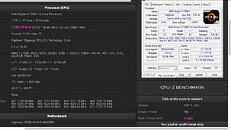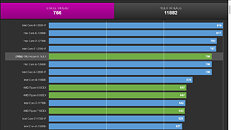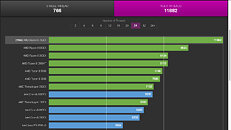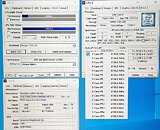- Joined
- Oct 9, 2007
- Messages
- 47,680 (7.43/day)
- Location
- Dublin, Ireland
| System Name | RBMK-1000 |
|---|---|
| Processor | AMD Ryzen 7 5700G |
| Motherboard | Gigabyte B550 AORUS Elite V2 |
| Cooling | DeepCool Gammax L240 V2 |
| Memory | 2x 16GB DDR4-3200 |
| Video Card(s) | Galax RTX 4070 Ti EX |
| Storage | Samsung 990 1TB |
| Display(s) | BenQ 1440p 60 Hz 27-inch |
| Case | Corsair Carbide 100R |
| Audio Device(s) | ASUS SupremeFX S1220A |
| Power Supply | Cooler Master MWE Gold 650W |
| Mouse | ASUS ROG Strix Impact |
| Keyboard | Gamdias Hermes E2 |
| Software | Windows 11 Pro |
An AMD Ryzen 9 7900X 12-core/24-thread processor sample was put through CPU-Z Bench, the internal benchmark of the app. The chip boosted up to 5.20 GHz in the test, and ran at temperatures as high as 86°C, as reported by CPU-Z. It scored 766 points in the single-threaded test, and 11882 points in the multi-threaded one. The single-threaded numbers in particular are interesting. 766 points would put the 7900X behind the Core i7-12700K and its "Golden Cove" P-core by around 3%. In the multi-threaded test, however, the 7900X, with its 11822 points, is in the league of the next-generation Core i7-13700K (8P+8E) processor, which was recently spotted scoring 11877 points with a 6.20 GHz overclock. The 7900X will hence be pushed as a superior alternative to the i7-13700K for productivity and creator tasks, whereas its single-threaded score ensures that it falls behind the i7-13700K in gaming by a fair bit.




View at TechPowerUp Main Site | Source




View at TechPowerUp Main Site | Source








